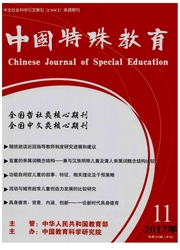

 中文摘要:
中文摘要:
本研究探讨了不同年级数学学习障碍儿童和普通儿童刷新能力的差异。研究选取障碍组与对照组被试共87名,采用活动记忆范式,分别对比了普通组与障碍组以及各年级组之间刷新功能的差异。结果发现:普通儿童在刷新任务中的正确率显著高于数学学习障碍儿童,反应时不存在显著差异;两组被试三次刷新任务的正确率低于一次和两次刷新任务的正确率,反应时不存在显著差异;三个年级的所有儿童的刷新正确率随年级升高呈递增趋势,反应时不存在显著差异。本研究认为,数学学习障碍儿童刷新能力发展迟缓是数学学习障碍产生的原因之一。
 英文摘要:
英文摘要:
This study probes into the difference in the updating ability between children with mathematics le- aming disabilities and normal children in different grades, by using the working memory paradigm to test a total of 87 children in the two groups. The results show the following: the normal children show a significantly higher rate of accuracy in an updating task than the children with mathematics learning disabilities, but the two groups show no significant difference in their reactions; the two groups show a lower rate of accuracy in an updating task on three occasions than on one or two occasions, but show no significant difference in their reactions; the children in three grades show an increasing rate of accuracy in the updating task as they study in higher grades, but show no significant difference in their reactions. The study indicates that the delayed development of the updating ability of children with mathematics learning disabilities is one of the causes for their mathematics learning disabilities.
 同期刊论文项目
同期刊论文项目
 同项目期刊论文
同项目期刊论文
 期刊信息
期刊信息
